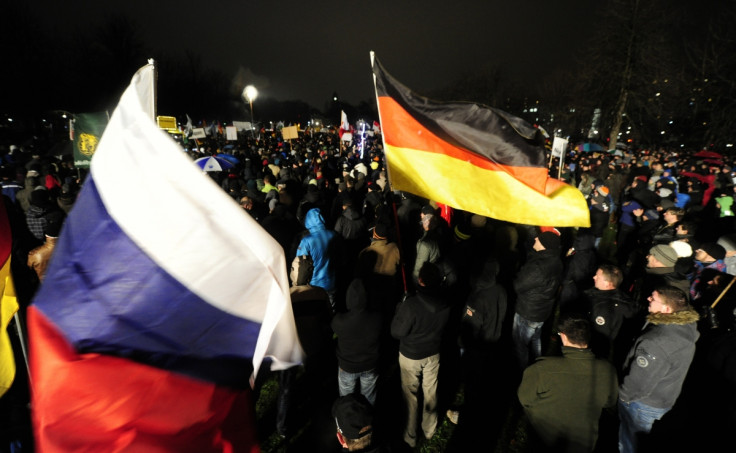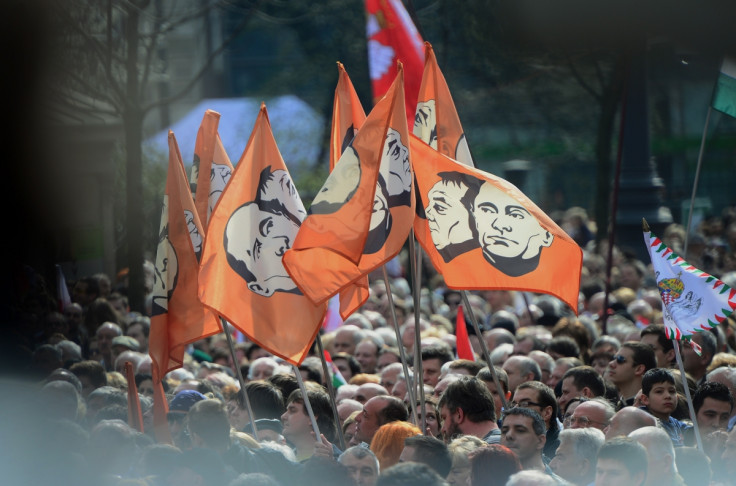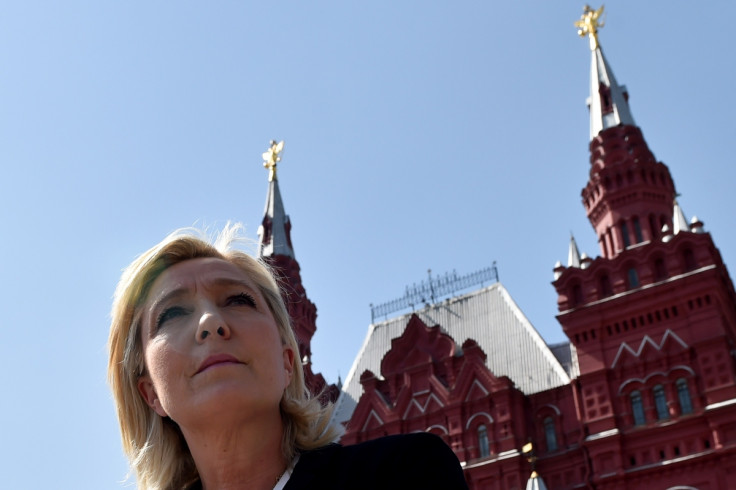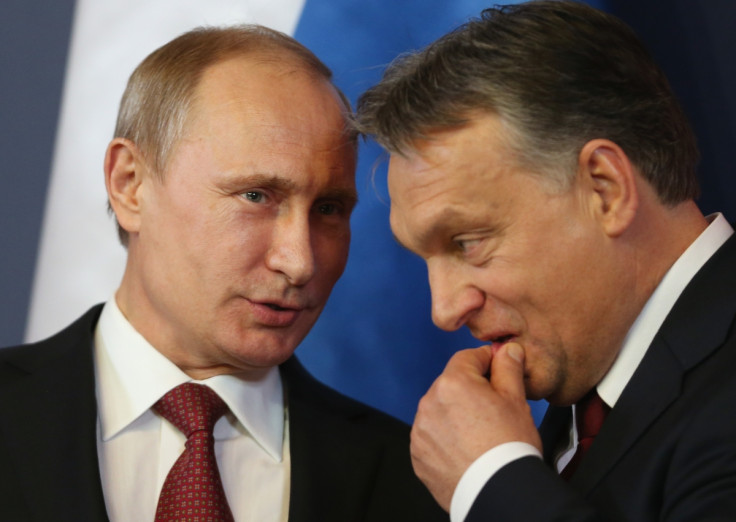Hybrid warfare: How Russia is exploiting the refugee crisis to split the EU

Shortly after the mass sex attacks allegedly carried out by refugee men in Cologne on New Year's Eve, a rumour began to circulate on the internet messaging boards of Germany's Russian-speaking immigrant community.
A 13-year-old Russian girl from Berlin's Marzahn district named "Lisa" had been kidnapped by immigrants, held for 30 hours and gang raped, it was claimed.
Russia's state media soon got wind of the rumours. "Lisa's" family appeared in a report on Russia's state-owned Channel One on 17 January, claiming that Berlin police had covered up the attack. The report showed members of the Russian ex-pat community staging a protest outside a refugee centre, demanding justice for "Lisa".
The incident snowballed into a diplomatic spat when Russian Foreign Minister Sergey Lavrov added his voice to those alleging a cover up, claiming police had failed to investigate the incident for "politically correct" reasons and demanding a full inquiry. There was just one problem: "Lisa" admitted making it all up.
State prosecutors said that the girl told them she had run away from home following a row with her family over school problems, and mobile phone records had placed her at the home of a school friend during the period she went missing. The friend, they added, was not suspected of any wrongdoing.
Information war
With Western sanctions imposed in the wake of Russia's annexation of Crimea continuing to hit the Russian economy hard, the incident marks a new escalation in what some have described as Russia's "hybrid war" against the European Union.
Employing methods including propaganda, disinformation, political pressure and support for extremist political groups, Russia stands accused of attempting to erode the European Union (EU) from within by exploiting its weak spots and pressure points.
"Russia is obviously not interested in a strong EU so any attempt that undermines the member states within Europe is beneficial for them because they can do business much better with member states. This is their general modus operandi within the EU," said Peter Kreko, director of Hungary's Political Capital think tank.
The refugee crisis poses one of the greatest challenges the EU has faced in years. Member states and national parliaments remain deeply divided on how to cope with the millions of refugees fleeing conflict and poverty in the Middle East and Africa who continue to arrive in their thousands. While the governments of Sweden and Germany declared refugees welcome, the central and eastern European countries through which millions have travelled en route to the propserous north remain fiercely opposed to admitting them.
To halt migrants, Hungary built a razor wire fence on its border with Croatia and Serbia with the country's Prime Minister Viktor Orban styling himself as the defender of Christian Europe against Muslim immigrants, while Poland refused to accept its EU quota of refugees.

Russia has lost no opportunity to exploit the crisis, heightening anti-immigrant paranoia and deepening divisions both within and between member states.
It has even been accused of deliberately targetting civilian areas in Syria with airstrikes to increase the number of refugees fleeing the country and travelling to Europe.
"There are a lot of arguments by Russian politicians, including Putin himself, that the refugee crisis shows the weakness of Europe so it makes it easier for Russia to present themselves as the successful strong hand politicians while Europe is quite weak," Kreko explained.
Disinformation is at the heart of Russia's campaign. Using a network of news organisations, including Russia Today which is published in several languages, the Kremlin pushes the line that Europe is under assault from a mass of criminal and radicalised migrants, with the complicity of a political class under the thrall of Washington that has lost touch with the lives of ordinary Europeans.
They are backed by a wider network of websites, pseudo think tanks, and social media pages, none proclaiming their Kremlin links, but all lauding Russia's strongman leader Vladimir Putin, and spreading virulently anti-immigrant propaganda.
"The propaganda of the Russian media outlets throughout Europe is full of conspiracy theories that want to deepen the crisis, that want to deepen the suspicions between Muslims and non-Muslims, fuelling the extremes and even inciting violent action with the hate propaganda," said Kreko.
In the wake of the "Lisa" incident, German authorities investigated the journalist responsible for the report for incitement to racial hatred.
Far-right connections
It is not just over the airwaves or through the internet that Russia pursues its strategy.
Putin's anti-homosexual, anti-liberal policies are lauded as a bulwark against the decadent West and its neo-liberal world order by far-right and anti-immigrant organisations throughout Europe.
In 2014, a Russian bank with close ties to the Kremlin was found to be providing the anti-immigrant French Front National party with funds. The party is currently riding high in the French polls, following the Islamic terror attacks in Paris last year, and party leader Marine Le Pen has repeatedly expressed admiration for Putin. In a visit to Moscow in May 2015, she met key officials including state Duma speaker Sergey Naryshkin.

In Germany far-right parties joined Russian ex-pats protesting in Berlin after the "Lisa" incident, with anti-Islam group Pegida staging a demonstration outside Chancellor Angela Merkel's office. Pegida supporters throughout Germany have been carrying placards at demonstrations lauding Putin, and condemning Merkel.
In March 2015, representatives from far-right parties throughout Europe met in St Petersburg, where they blamed the West for causing the Ukraine crisis, and lauded Russia. Far-right and far-left politicians also acted as electoral "observers" during the Crimea independence referendum of March, 2014, regarded as illegal by much of the international community.
Anton Shekhovstov, a visiting fellow for the Institute for Human Sciences in Vienna and expert on the European far right, told IBTimes UK that the Kremlin had for several years been nurturing connections with the European far-right and anti-immigrant parties.
"Russia is trying to weaken the West by implementing this strategy of divide and rule. And it supports the European far-right parties but also left-wing parties which are either anti-EU or Eurosceptic," he said.
"Russia is once again attempting to become a global super-player but it cannot compete on a fair basis with the West. Especially a united West."
After sweeping successes in the 2014 parliamentary election, far-right and anti-immigration parties form formidable voting blocks in the European parliament, where they rail against the dangers of mass immigration, and lobby for the EU to drop its sanctions against Russia.
Leading party figures also play an important role in the Kremlin's media networks. Kreko said that they peddle the views on Russian media: "Yes, Europe performs extremely bad in coping with the refugee crisis, and the US and Merkel are to blame for this problem: Obama because of the wars, Merkel because of the open-door policy. Look at Russia. Russia is quite successful in coping with this crisis and their strong-hand policy can provide the solution in Syria as well."
Kremlin builds alliances in eastern and central Europe
It is not just figures on the fringes of European politics who have received Kremlin backing. In east and central European states, where anti-immigration rhetoric has played well at the ballot box amid unemployment and economic stagnation, Russia has built alliances with political leaders and key officials.
"To be frank, a lot of political players in Europe capitalise on using very strong anti-rhetoric and base their policies on the domestic refugee crisis. They are interested in keeping the refugee flow, because if the refugees disappear more urgent issues appear on the agenda," said Kreko.
Orban last week visited Moscow for a meeting with Putin, where he heaped praise Russia's leader, and criticised the EU for its immigration policies.

Of immigration, Orban said after the meeting: "Europe's largest nations now believe it's mostly positive. Our view is that it's bad."
Czech Republic President Milos Zeman has alleged that the refugee crisis was engineered by the Islamist Muslim Brotherhood to undermine Europe, and appeared at a Pegida rally in Prague in September.
Zeman has also built alliances with the Russian president, breaking ranks with other Western leaders to attend the military parade in Moscow last year marking the 70th anniversary of the USSR's victory in the Great Patriotic War.
EU response
A leaked report recently revealed that US intelligence agencies have launched a major review into Russian funding of political parties in Europe. "Right across the EU we are seeing alarming evidence of Russian efforts to unpick the fabric of European unity on a whole range of vital strategic issues," a senior British government official told the Telegraph.
The EU's response has been sluggish. An eight-person team was set up last year to counter Russian anti-EU propaganda, but its ability to combat the Kremlin's narrative has been limited, Kreko said.
"My impression is that there is much more talk than action. The difference between Russia and the West is that the West is talking about it while Russia is doing it. I think this imbalance should be changed but it needs more political will not only beautiful statements – and more money."
"If you position it as a security threat it points to an important fact: which is that it aims to undermine the order in Europe and it is not an overstatement."
For others, though, there is equally a risk in overreacting. Bettina Renz, an associate professor of politics at the University of Nottingham, said that terms like "hybrid warfare" can be damaging.
"With these debates we need to be careful we don't slip into calls for censorship because that is what we criticise them [Russia] for, for controlling the media and freedom of speech. A bit more confidence in our values and in freedom of opinion would be a better reaction," she said.
"There were occasions during the Cold War when there were assumptions the Soviet leadership was much better at strategy. And in hindsight it turned out they weren't quite as good. There is a danger we are going down that road again."
© Copyright IBTimes 2024. All rights reserved.























